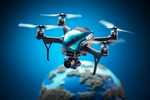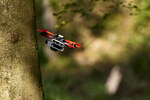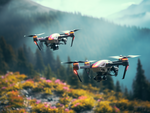Student Projects
To apply, please send your CV, your Ms and Bs transcripts by email to all the contacts indicated below the project description. Do not apply on SiROP . Since Prof. Davide Scaramuzza is affiliated with ETH, there is no organizational overhead for ETH students. Custom projects are occasionally available. If you would like to do a project with us but could not find an advertized project that suits you, please contact Prof. Davide Scaramuzza directly to ask for a tailored project (sdavide at ifi.uzh.ch).
Upon successful completion of a project in our lab, students may also have the opportunity to get an internship at one of our numerous industrial and academic partners worldwide (e.g., NASA/JPL, University of Pennsylvania, UCLA, MIT, Stanford, ...).
-
Motion Segmentation with Neuromorphic Sensing

This project investigates how neuromorphic vision can enhance motion understanding for mobile systems. By leveraging high-temporal-resolution sensing from event cameras, it aims to reliably separate ego-motion from independently moving objects for improved perception and navigation.
-
Event-based Perception for Autonomous Driving

This project explores how event-based sensing can enhance perception for autonomous driving systems. It investigates the integration of asynchronous, high-temporal-resolution visual signals with conventional sensing modalities to improve robustness, latency, and reliability under challenging real-world conditions.
-
Learning Rapid UAV Exploration with Foundation Models

Recent research has demonstrated significant success in integrating foundational models with robotic systems. In this project, we aim to investigate how these foundational models can enhance the vision-based navigation of UAVs. The drone will utilize learned semantic relationships from extensive world-scale data to actively explore and navigate through unfamiliar environments. While previous research primarily focused on ground-based robots, our project seeks to explore the potential of integrating foundational models with aerial robots to enhance agility and flexibility.
-
Vision-Based Reinforcement Learning in the Real World

We aim to learn vision-based policies in the real world using embedded optimization layers within reinforcement learning.
-
Observability-and-Perception-aware Planning and Control for Event-Based Object Reconstruction

Design a model-based / learning-based controller that is aware of state observability and sensor perception objectives for object reconstruction using a quadrotor with an egocentric camera.
-
Vision-Based Drone Racing from Raw Pixels with Deep Reinforcement Learning

Explore the possibility of high-speed drone racing using raw RGB camera images only.
-
High-Speed Object Pickup During Quadrotor Flight with Reinforcement Learning

Explore the possibility of catching/picking up an object during high-speed agile flight, with potential application in fast turnaround delivery.
-
Event Representation Learning for Control with Visual Distractors

This project develops event-based representation learning methods for control tasks in environments with visual distractors, leveraging sparse, high-temporal-resolution event data to improve robustness and efficiency over traditional frame-based approaches.
-
Rethinking RNNs for Neuromorphic Computing and Event-based Vision

This thesis develops hardware-optimized recurrent neural network architectures with novel parallelization and kernel-level strategies to efficiently process event-based vision data for real-time neuromorphic and GPU-based applications.
-
Spiking Architectures for Advanced Event-Based Temporal Reasoning

This thesis explores novel spiking neural network architectures that leverage event-based vision data and emergent neural synchronization to enable efficient and robust temporal reasoning for dynamic scene understanding and sequential tasks.
-
Vision-Based Tactile Sensor for Humanoid Hands (in collaboration with Soft Robotics Lab)

Humanoid robots require tactile sensing to achieve robust dexterous manipulation beyond the limits of vision-based perception. This project develops an event-based tactile sensor to provide low-power, high-bandwidth force estimation from material deformation, with the goal of integrating it into a human-scale robotic hand.
-
Surgical HDR Imaging with an Event Camera (in collaboration with Balgrist)

Surgical environments present an extreme HDR challenge, causing standard cameras to lose critical detail due to overexposure. This project introduces a neuromorphic sensor fusion framework integrating RGB sensors with asynchronous event cameras to overcome these limitations. By exploiting the event camera's superior dynamic range ($>120$ dB) and temporal resolution, our method recovers texture and motion in saturated areas. The result is robust HDR reconstruction and low-latency tracking that outperforms traditional optical image enhancement techniques, ensuring reliable computer vision performance in harsh intraoperative lighting. This project is conducted at RPG and Balgrist under the supervision of Prof. Dr. Fürnstahl.
-
Safe Quadrotor Landing from Aggressive Racing Conditions via Reinforcement Learning

This project addresses autonomous landing of a high-speed quadrotor after aggressive racing, using only onboard camera data without reliable state estimation. The drone must land safely within track boundaries while avoiding obstacles, despite track symmetries and limited information.
-
Adaptive Frame Rate Management in Visual-Inertial Odometry Using Reinforcement Learning

This project explores using reinforcement learning to reduce the computational load of visual–inertial odometry by selecting only the most informative camera frames for processing. An RL policy decides when a new frame is needed versus when inertial propagation is sufficient, integrating IMU cues, feature statistics, and uncertainty estimates into a hybrid VIO pipeline.
-
Event camera-based drone landing on a dynamic platform

This project targets robust landing in GPS-denied, highly dynamic scenarios—such as moving or vibrating platforms—where conventional RGB-camera SLAM fails due to blur and latency. By leveraging event cameras’ high temporal resolution and robustness to rapid motion, drones can maintain accurate localization and stability during challenging, fast landings.
-
Vision-based Navigation in Dynamic Environment via Reinforcement Learning

In this project, we are going to develop a vision-based reinforcement learning policy for drone navigation in dynamic environments. The policy should adapt to two potentially conflicting navigation objectives: maximizing the visibility of a visual object as a perceptual constraint and obstacle avoidance to ensure safe flight.
-
Learning Robust Agile Flight via Adaptive Curriculum

This project focuses on developing robust reinforcement learning controllers for agile drone navigation using adaptive curricula. Commonly, these controllers are trained with a static, pre-defined curriculum. The goal is to develop a dynamic, adaptive curriculum that evolves online based on the agents' performance to increase the robustness of the controllers.
-
Vision-Based Drone Control with Structured Networks & Symmetry

Vision-based reinforcement learning controllers can achieve impressive drone flight performance, but training them is often slow and data-hungry because standard networks must re-learn the same behaviors across equivalent viewpoints and orientations. In this project, we will speed up vision-based drone control policy learning by using structured (symmetry-aware / equivariant) neural networks that encode physical and geometric symmetries directly into the policy. By enforcing these structure constraints, the controller can generalize better across rotations and scene variations, improving sample efficiency and sim-to-real transfer. Applicants should have a solid understanding of reinforcement learning, machine learning experience (Jax, PyTorch), and programming experience in Python and C++.
-
Drone Racing Meet Differentiable simulation

In this project, we investigate how DiffSim (differentiable simulation) can accelerate learning for drone racing by enabling end-to-end gradient-based training with Backpropagation Through Time (BPTT). Instead of relying solely on sample-inefficient trial-and-error, we use a differentiable simulator to propagate learning signals through the drone dynamics and control pipeline over time, allowing the controller to improve from trajectories much more efficiently. Our objective is to develop a training framework that learns high-speed, gate-to-gate racing behaviors in significantly less wall-clock time, while maintaining stable and agile flight. Applicants should be comfortable with control and learning for dynamical systems, have machine learning experience (e.g., Jax, PyTorch), and be proficient in C++ and Python.
-
Neural Quadrotor Dynamics

This project leverages the Neural Robot Dynamics (NeRD) framework to build a high-fidelity, high-speed neural simulator for a quadrotor UAV. Rather than relying solely on classical rigid-body dynamics and hand-crafted aero/actuation models, we will train a neural network to replace key low-level simulation components (e.g., unmodeled dynamics, actuator response, residual forces), enabling faster rollouts without sacrificing accuracy. The simulator will be fine-tuned on real flight logs to learn a vehicle-specific model and reduce the sim-to-real gap. Thanks to the model’s differentiability, the resulting engine also supports differentiable simulation (DiffSim) for gradient-based system identification, trajectory optimization, and policy learning. Ultimately, we aim to accelerate training of advanced flight control policies and improve zero-shot transfer by matching simulation to the target platform’s true dynamics. Applicants should be comfortable with control and learning for dynamical systems, have ML experience (e.g., JAX/PyTorch), and be proficient in C++ and Python.
-
Evolutionary Optimization Meets Differentiable Simulation

The goal is to investigate how the latest differentiable simulation strategies push the limits of learning real-world tasks such as agile flight.
-
Codesign of shape and control: A study in autonomous perching

We aim to co-design a controller and the shape of a glider for a perching maneuver, involving deployment on the real system.